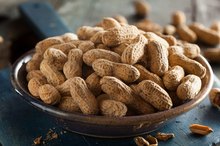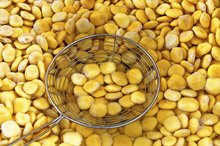What does fact checked mean?
At Healthfully, we strive to deliver objective content that is accurate and up-to-date. Our team periodically reviews articles in order to ensure content quality. The sources cited below consist of evidence from peer-reviewed journals, prominent medical organizations, academic associations, and government data.
- Centers for Disease Control and Prevention: Low-Energy-Dense Foods and Weight Management: Cutting Calories While Controlling Hunger
- Office of Dietary Supplements: Iron
- Office of Dietary Supplements: Vitamin A
The information contained on this site is for informational purposes only, and should not be used as a substitute for the advice of a professional health care provider. Please check with the appropriate physician regarding health questions and concerns. Although we strive to deliver accurate and up-to-date information, no guarantee to that effect is made.
Hulled vs. Unhulled Sesame Seeds
Nutty, sweet and buttery, sesame seeds go well with a number of different foods, including poultry, beans, fish and grains 1. When you're at the grocery store, you may notice that these tiny seeds are available hulled and unhulled. While you might not give much thought when choosing one over the other for your dishes, knowing the nutritional differences may help you decide which type of sesame seed makes a better fit for your diet.
Calories and Macronutrients
When it comes to calories, carbs, protein and fat, there isn't much difference between hulled and unhulled sesame seeds 1. One tablespoon of hulled seeds has 51 calories, 2 grams of carbs, 1.5 gram of protein, 4 grams of fat and 1.5 gram of fiber. The same serving of unhulled seeds has 52 calories, 2 grams of carbs, almost 2 grams of protein, 4 grams of fat and 1 gram of fiber.
Sesame seeds are a calorie-dense food, which means they have a high calorie count compared to serving size 1. If you're counting calories, watch your portions so you don't overdo it.
- When it comes to calories, carbs, protein and fat, there isn't much difference between hulled and unhulled sesame seeds 1.
Vitamin Content
Nutritional Facts of David Sunflower Seeds
Learn More
In a small serving size, sesame seeds may not make a huge impact on your daily vitamin intake, but there are some slight differences in the vitamin content of the hulled and unhulled seeds, most notably in vitamin A 1.
One tablespoon of hulled sesame seeds contains 8 micrograms of dietary folate equivalent and 6 international units of vitamin A 17. The same serving of unhulled sesame seeds contains 9 micrograms of DFE and 1 international unit of vitamin A 1. Although vitamin A deficiency is rare in the U.S., according to the Office of Dietary Supplements, it is an essential nutrient that supports immune health, reproduction and vision 67.
Both seeds also contain a small amount of some of the B vitamins, in addition to folate, including thiamin, riboflavin, niacin and vitamin B-6.
Calcium and Iron
One of the distinct nutritional differences between hulled and unhulled sesame seeds is their calcium and iron content 1. One tablespoon of hulled sesame seeds contains 0.7 milligrams of iron and 11 milligrams of calcium, while the unhulled seeds contains 1.3 milligrams of iron and 88 milligrams of calcium 1.
Both calcium and iron are nutrients of concern, according to the Dietary Guidelines for Americans 2010, which means some people may not be getting enough of these minerals in their diet 56. Adequate calcium intake is necessary for bone health, and you need iron for proper cell function, making hormones and carrying oxygen throughout your body.
Other Minerals
How Much EPA & DHA Are in Chia Seeds?
Learn More
Like the other nutrients, there are slight nutritional differences in the amount of magnesium, phosphorus, potassium and zinc in the two types of sesame seeds 1. One tablespoon of hulled sesame seeds contains 29 milligrams of magnesium, 66 milligrams of phosphorus, 35 milligrams of potassium and 0.9 milligrams of zinc 1. The same serving of unhulled sesame seeds contains 32 milligrams of magnesium, 57 milligrams of phosphorus, 42 milligrams of potassium and 0.7 milligrams of zinc 1.
Related Articles
References
- Food.com: Sesame Seeds
- USDA National Nutrient Database: Seeds, Sesame Seeds, Whole, Dried
- USDA National Nutrient Database: Seeds, Sesame Seed Kernels, Toasted, Without Salt (Decorticated)
- Centers for Disease Control and Prevention: Low-Energy-Dense Foods and Weight Management: Cutting Calories While Controlling Hunger
- U.S. Department of Agriculture and U.S. Department of Health and Human Services: Dietary Guidelines for Americans, 2010
- Office of Dietary Supplements: Iron
- Office of Dietary Supplements: Vitamin A
- Alipoor B, Haghighian MK, Sadat BE, Asghari M. Effect of Sesame Seed on Lipid Profile and Redox Status in Hyperlipidemic Patients. Int J Food Sci Nutr. 2012;63(6):674-8.
- Khadem Haghighi M, Alipoor B, Eftekhar Sadat B, Malek Mahdavi A, Moghaddam A, Vatankhah AM. Effects of Sesame Seed Supplementation on Lipid Profile and Oxidative Stress Biomarkers in Patients with Knee Osteoarthritis. Health Promot Perspect. 2014;4(1):90-7.
- Mirmiran P, Bahadoran Z, Golzarand et al. Ardeh (Sesamum Indicum) Could Improve Serum Triglycerides and Atherogenic Lipid Parameters in Type 2 Diabetics: A Randomized Clinical Trial. Arch Iran Med 2013; 16: 652-656.
- Natural Standard. (2014). Sesame [Monograph].
Writer Bio
Jill Corleone is a registered dietitian and health coach who has been writing and lecturing on diet and health for more than 15 years. Her work has been featured on the Huffington Post, Diabetes Self-Management and in the book "Noninvasive Mechanical Ventilation," edited by John R. Bach, M.D. Corleone holds a Bachelor of Science in nutrition.









